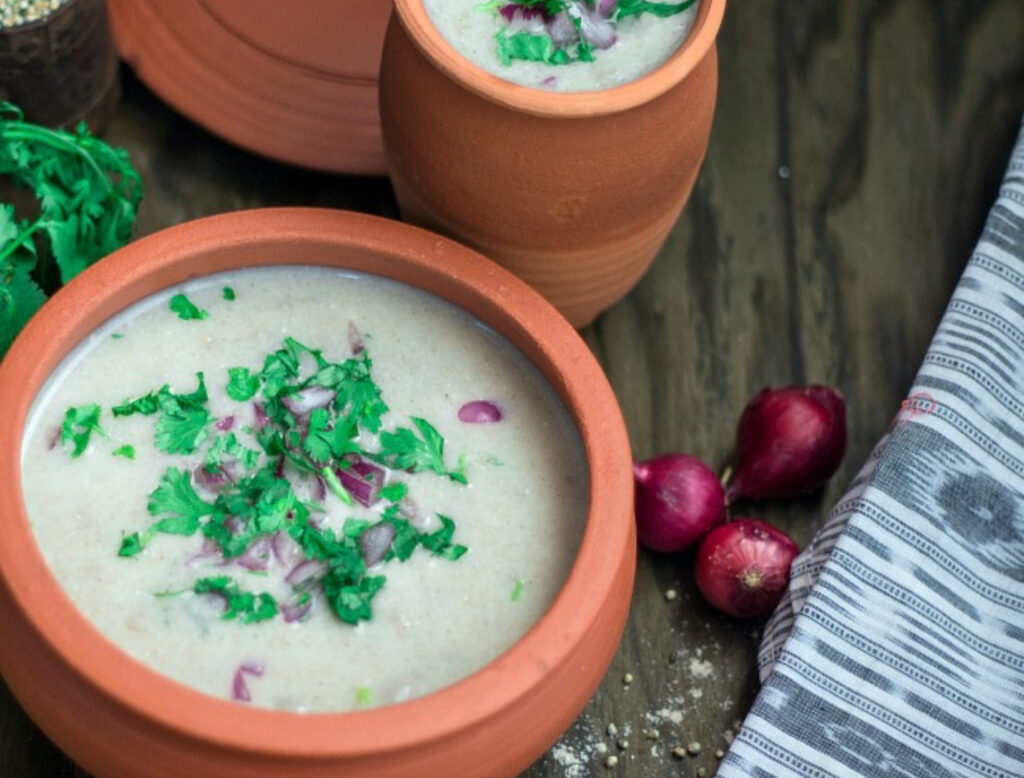For centuries, Koozh has been a staple breakfast dish in Tamil Nadu and Kerala, standing as a testament to South India’s deep-rooted culinary traditions. This fermented rice and lentil porridge is not just a source of sustenance but also a nutritional powerhouse, offering probiotic benefits, slow-burning energy, and rich flavors. Traditionally paired with oorugai (spicy pickled vegetables) and an array of chutneys, koozh is seeing a revival as more people reconnect with their ancestral food heritage and embrace sustainable eating habits.
From village kitchens to urban health-conscious communities, koozh is proving to be more than just a meal—it is a celebration of fermentation, nutrition, and cultural legacy. Let’s explore the origins, health benefits, and modern resurgence of this beloved dish.
The Origins of Koozh: A Dish Rooted in Tradition
Koozh has been a nutritional mainstay for generations, particularly among farmers and laborers who needed a hearty and energizing breakfast to sustain them through long hours of work. Traditionally, it was prepared by fermenting rice, millets, or lentils overnight, which resulted in a tangy, thick porridge that was easy to digest yet incredibly filling.
In rural South India, koozh is often served in earthen pots, which help maintain its cool, refreshing texture—a feature especially appreciated during hot summer months. The dish was customarily paired with spicy accompaniments like green chili, raw onions, and pickled vegetables, creating a perfect balance of flavors and textures.
While it was once associated mainly with agrarian communities, koozh has now gained popularity among urban dwellers seeking healthy, probiotic-rich foods that support gut health and overall well-being.
The Science of Fermentation: Why Koozh is a Superfood
At its core, koozh is a fermented dish, meaning it undergoes a natural lacto-fermentation process where beneficial bacteria break down complex carbohydrates, enhancing its nutritional profile.
Health Benefits of Fermented Koozh
Probiotic-Rich for Gut Health
• Fermentation introduces beneficial bacteria that aid digestion.
• Helps maintain a balanced gut microbiome, which supports immunity and metabolism.
Nutrient Bioavailability
• The fermentation process breaks down anti-nutrients, making minerals like iron, calcium, and magnesium more easily absorbed.
Sustained Energy Release
• Koozh is made from whole grains or millets, providing slow-digesting carbohydrates that keep hunger at bay for extended periods.
• Perfect for those seeking long-lasting energy without blood sugar spikes.
Cooling Properties
• In Ayurveda, fermented foods like koozh are known for their cooling effects, making them ideal for consumption in hot climates.
Naturally Gluten-Free & Gut-Friendly
• Traditionally made with rice or millet, koozh is gluten-free and a great option for those with digestive sensitivities.
By embracing fermented foods like koozh, we tap into centuries-old wisdom that promotes holistic health while also reducing reliance on processed foods.
The Role of Oorugai: A Flavorful, Fermented Sidekick
One of the most traditional accompaniments to koozh is oorugai—a category of spicy, fermented pickles made from a variety of vegetables, spices, salt, and oil.
Oorugai not only enhances the taste of koozh but also adds additional probiotic benefits. The fermentation of mango, lemon, gooseberry (amla), or garlic in a mixture of spices, salt, and mustard seeds creates a pungent, tangy, and fiery condiment that elevates the simple porridge to a gourmet experience.
Popular Oorugai Varieties
Mango Pickle (Maavadu Oorugai) – A classic, with raw mangoes fermented in mustard and red chili.
Lemon Pickle (Elumichai Oorugai) – A tangy delight, packed with vitamin C and a bold citrusy kick.
Garlic Pickle (Poondu Oorugai) – A pungent yet flavorful option known for its immune-boosting properties.
Mixed Vegetable Pickle – Features carrots, green chilies, ginger, and more, offering a complex spice profile.
When paired with koozh, these pickles cut through the mild, tangy richness of the porridge, providing a contrast of textures and flavors that make the meal deeply satisfying.
How to Make Traditional Koozh at Home
While koozh has many regional variations, the basic preparation remains simple and accessible.
Ingredients:
• 1 cup parboiled rice (or millet for a more nutritious version)
• 4 cups water
• 1/2 cup cooked rice (for fermentation starter)
• Salt to taste
Preparation:
Cook the Rice: Boil rice in water until soft and porridge-like in consistency.
Fermentation: Allow the cooked rice to cool slightly. Add the previously cooked rice starter and leave it to ferment overnight at room temperature.
Serving: Add cold water to thin out the porridge. Mix well and serve chilled.
Accompaniments: Garnish with raw onions, green chilies, oorugai, buttermilk, or fresh herbs.
For an authentic touch, serve koozh in clay pots, which help maintain its cool temperature and enhance the flavor.
Growing Interest in Fermented Foods
With increasing awareness of gut health and probiotic-rich diets, people are turning to traditional fermented foods like koozh as a natural alternative to processed health supplements.
Sustainable & Zero-Waste Cooking
Koozh is a sustainable dish, as fermentation extends the shelf life of grains, reducing food waste and reliance on refrigeration.
Millet-Based Alternatives for a Healthier Future
With the push for millet-based diets due to their high fiber, protein, and micronutrient content, koozh made with ragi (finger millet), bajra (pearl millet), or kambu (pearl millet) is gaining popularity as a superfood alternative.
The Rise of Cultural Food Movements
There is a growing movement to reclaim and celebrate traditional foods, particularly in urban spaces where people are rediscovering the power of ancestral wisdom.
From health-conscious millennials to food historians and chefs, koozh is being recognized not just for its health benefits but also for its deep cultural significance.
Koozh as a Culinary & Cultural Treasure
At its core, koozh is more than just a meal—it is a symbol of heritage, sustainability, and health. It represents a culinary tradition that honors nature, respects time-honored methods, and prioritizes nourishment in its purest form.
By reviving dishes like koozh and embracing fermentation practices, we are reconnecting with ancestral wisdom while making choices that benefit both our health and the environment.
So, whether you’re looking to improve your gut health, explore traditional Indian cuisine, or adopt sustainable eating habits, a bowl of koozh with oorugai is a delicious place to start.
No comments yet.








